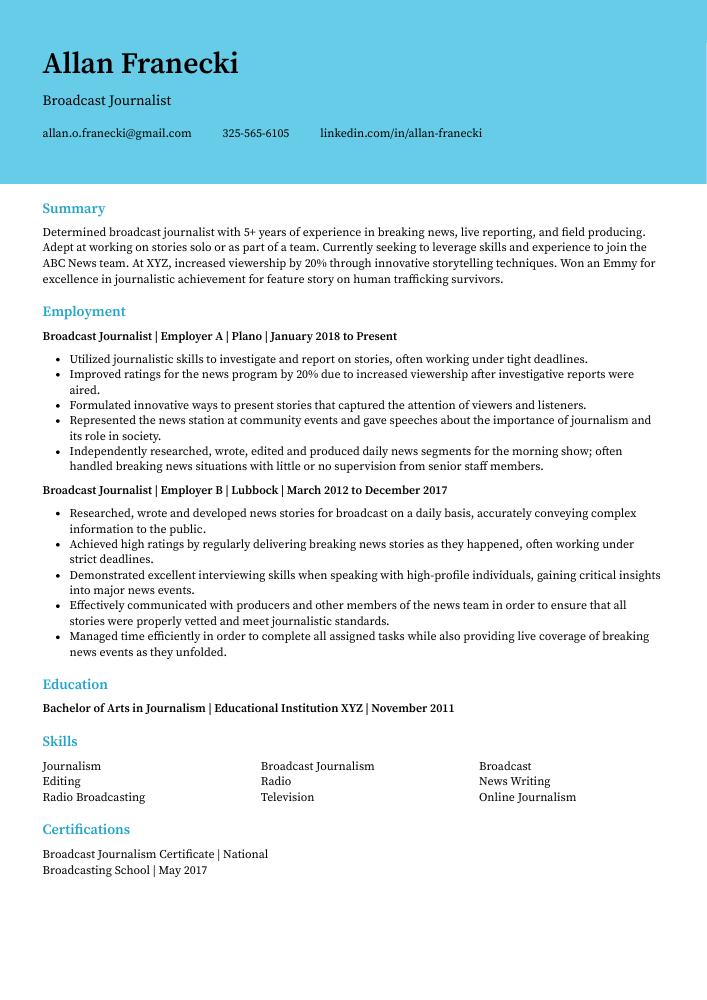Broadcast Journalist Resume Guide
Broadcast journalists are responsible for delivering the news on television and radio. They research and write stories, conduct interviews, and often serve as on-air hosts. In larger markets, broadcast journalists may specialize in a particular type of news, such as sports or weather.
As a broadcast journalist, you know the importance of delivering news in an engaging and captivating way. But to get your foot in the door of your dream media outlet, you first need to write a resume that catches the attention of hiring managers.
This guide will walk you through the entire process of creating a top-notch resume. We first show you a complete example and then break down what each resume section should look like.
Table of Contents
The guide is divided into sections for your convenience. You can read it from beginning to end or use the table of contents below to jump to a specific part.
Broadcast Journalist Resume Sample
Jettie Pfannerstill
Broadcast Journalist
[email protected]
590-467-2810
linkedin.com/in/jettie-pfannerstill
Summary
Determined broadcast journalist with 5+ years of experience in breaking news, live reporting, and field producing. Adept at working on stories solo or as part of a team. Currently seeking to leverage skills and experience to join the DEF News team. At XYZ, increased viewership by 20% through innovative storytelling techniques. Won an award for excellence in journalistic achievement for a feature story on human trafficking survivors.
Experience
Broadcast Journalist, Employer A
Honolulu, Jan 2018 – Present
- Utilized journalistic skills to investigate and report on stories, often working under tight deadlines.
- Improved ratings for the news program by 20% due to increased viewership after investigative reports were aired.
- Formulated innovative ways to present stories that captured the attention of viewers and listeners.
- Represented the news station at community events and gave speeches about the importance of journalism and its role in society.
- Independently researched, wrote, edited and produced daily news segments for the morning show; often handled breaking news situations with little or no supervision from senior staff members.
Broadcast Journalist, Employer B
Amarillo, Mar 2012 – Dec 2017
- Researched, wrote and developed news stories for daily broadcasts, accurately conveying complex information to the public.
- Achieved high ratings by regularly delivering breaking news stories as they happened, often working under strict deadlines.
- Demonstrated excellent interviewing skills when speaking with high-profile individuals, gaining critical insights into major news events.
- Effectively communicated with producers and other news team members to ensure that all stories were adequately vetted and met journalistic standards.
- Managed time efficiently to complete all assigned tasks while providing live coverage of breaking news events as they unfolded.
Skills
- Journalism
- Broadcast Journalism
- Editing
- Radio
- News Writing
- Radio Broadcasting
- Television
- Online Journalism
Education
Bachelor of Arts in Journalism
Educational Institution XYZ
Nov 2011
Certifications
Broadcast Journalism Certificate
National Broadcasting School
May 2017
1. Summary / Objective
The summary at the top of your resume is like a teaser for a movie – it should give the employer an overview of who you are and why you would excel as a broadcast journalist. Some things you may want to mention in your summary include your experience in live news, your ability to think on your feet, and the awards you have won for your reporting.
Below are some resume summary examples:
Dependable and detail-oriented broadcast journalist with 3+ years of experience producing live and taped news segments. Confident under pressure, successfully managing breaking news situations while maintaining composure on air. In previous roles increased viewership by 20% during the morning show timeslot. Hoping to utilize top-notch research skills as well as writing and editing chops at DEF News.
Professional broadcast journalist with more than 5 years of experience in news reporting and anchoring. Expertise in field journalism, studio production, and post-production editing. At DEF, led a team of 4 reporters in the coverage of breaking news stories. Consistently recognized for delivering high-quality work under tight deadlines. Holds a degree in broadcast journalism from XYZ University.
Talented broadcast journalist with 7+ years of experience in a top-rated news station. Seeking to join DEF News as a field reporter, where I can utilize my skills in live reporting, writing, and editing under high-pressure situations. While working at XYZ News, increased viewership by 33% during the morning show by introducing new segments such as “Good Morning America” and “World News Now.”
Well-rounded broadcast journalist with 6+ years of experience in the field. In previous roles, increased viewership by 26% due to innovative and enterprising reporting methods. Seeking to join DEF News as a field reporter to utilize strengths in research, writing, and on-camera delivery to provide high-quality news stories that inform and engage viewers.
Reliable and detail-oriented broadcast journalist with 5+ years of experience in writing, producing, and editing news stories for a major television network. Specializes in live breaking news coverage and investigative journalism. At DEF News, covered the 2016 presidential election and produced award-winning segments on the opioid epidemic.
Amicable and detail-oriented broadcast journalist with 6+ years of experience conducting interviews, writing stories and hosting live broadcasts. Recently recognized as the “Outstanding Young Journalist” by the New York Press Club. Hoping to bring my passion for storytelling and extensive knowledge of current affairs to DEF News.
Passionate broadcast journalist with over 6 years of experience in news writing, producing, and reporting. My work has been featured on networks such as ABC, NBC, and CBS. I am currently seeking a position at a major news station where I can utilize my skills to produce high-quality content that informs and engages viewers.
2. Experience / Employment
The work history/experience section is next, and it should be written in reverse chronological order. This means your most recent job is listed first.
Keep the bulk of this section to bullet points; doing so makes it easier for the reader to quickly understand what you want to say. When writing each point, include specifics on what you did and any quantifiable results achieved.
For example, instead of saying, “Reported on breaking news stories,” you could say, “Covered live breaking news stories as they unfolded, including natural disasters and political unrest.”
To write effective bullet points, begin with a strong verb or adverb. Industry specific verbs to use are:
- Researched
- Wrote
- Edited
- Filmed
- Anchored
- Produced
- Reported
- Investigated
- Interviewed
- Fielded
- Live-tweeted
- Posted
- Curated
- Shared
Other general verbs you can use are:
- Achieved
- Advised
- Assessed
- Compiled
- Coordinated
- Demonstrated
- Developed
- Expedited
- Facilitated
- Formulated
- Improved
- Introduced
- Mentored
- Optimized
- Participated
- Prepared
- Presented
- Reduced
- Reorganized
- Represented
- Revised
- Spearheaded
- Streamlined
- Structured
- Utilized
Below are some example bullet points:
- Spearheaded successful news coverage by structuring stories, conducting interviews and writing scripts that were both informative and engaging.
- Assessed current affairs on a daily basis to determine which stories were most relevant to the target audience, curating a selection of content that was both timely and interesting.
- Successfully managed a team of junior journalists, providing guidance and direction in order to produce high-quality news segments.
- Demonstrated excellent written and verbal communication skills when delivering the news live on air, captivating the audience with my natural delivery style.
- Adhered strictly to all editorial guidelines when researching, writing and reporting stories, ensuring that all content met the required standards before going to air.
- Compiled research and conducted interviews for on-air broadcasts, often working under tight deadlines to ensure all content was accurate and up-to-date.
- Participated in pre-production meetings with producers and other journalists to discuss story angles, potential interviewees and overall vision for the broadcast.
- Actively sought out breaking news stories and provided live coverage of events as they unfolded, thinking on my feet to adapt to changing circumstances.
- Advised members of the public on air about relevant issues and advised producers off air about potential stories or areas of interest.
- Expedited the post-production process by writing concise scripts that could be easily understood by the audience, resulting in a finished product that met or exceeded expectations.
- Reliably reported on daily news stories, often working long hours and under tight deadlines; regularly filled in for the lead anchor when needed.
- Reduced editing time per story by 10% due to improved writing skills and better planning/organization of material.
- Edited video footage using Adobe Premiere Pro and other software programs, ensuring that all stories met the required length and contained no errors.
- Anchored live broadcasts on a regular basis, both solo and as part of a team; handled impromptu changes to the script or schedule calmly and professionally.
- Investigated potential news stories by conducting interviews, research and undercover work when necessary; often broke new ground with exclusive reports that garnered high ratings for the network.
- Shared accurate and timely news stories with the public through on-air broadcasting, while maintaining impartiality and objectivity at all times.
- Produced high quality news segments by conducting thorough research, interviewing relevant sources and double-checking facts; helped increase viewership by 10%.
- Revised scripts for errors in grammar, spelling and syntax before going on air; minimized negative feedback from viewers as a result.
- Demonstrated exceptional verbal communication skills when reading the news aloud clearly and concisely; received positive feedback from colleagues regarding vocal delivery.
- Proficiently operated broadcast equipment such as cameras, microphones and editing software to produce professional quality news segments; trained 2 new interns on proper usage of equipment.
- Streamlined the news gathering process by conducting in-depth research and interviews with key sources to produce high-quality, well-rounded stories.
- Optimized workflows and procedures to increase efficiency in the newsroom, resulting in a 20% reduction in story turnaround time.
- Reported on a wide range of topics, including breaking news stories, human interest pieces and investigative reports; won 2 journalism awards for excellence in reporting.
- Prepared daily news broadcasts, ensuring that all stories were accurate and up-to-date; regularly received positive feedback from viewers regarding the quality of the broadcast.
- Competently operated a variety of audio/visual equipment during live broadcasts, including cameras, mixers and microphones; frequently commended by producers for smooth transitions between segments.
- Posted breaking news stories on the station website and social media platforms, which increased web traffic by 25%.
- Introduced viewers to local businesses, non-profit organizations and community events through weekly segments that aired on the morning show.
- Presented live coverage of breaking news stories, including last year’s hurricane evacuation efforts; received viewer feedback praising my composure under pressure.
- Live-tweeted during commercial breaks of popular primetime shows to engage with viewers and promote upcoming station programming; gained over 1,000 new followers as a result.
- Meticulously researched and fact-checked all script content prior to broadcast; ensured that all information presented was accurate and up-to-date.
- Filmed and edited 60-second news segments independently, often working under tight deadlines and in high-pressure situations.
- Fielded tips from viewers and sources, conducting interviews and on-the-scene research to produce hard-hitting investigative pieces that led to the arrest of 2 public officials.
- Resourcefully managed a team of 4 camera operators during breaking news stories, ensuring that all footage was captured while maintaining safety as the top priority.
- Reorganized the field production schedule to increase efficiency by 25%, resulting in a cost savings of $1,500 per month for the station.
- Coordinated live remote broadcasts for special events such as parades and political rallies, setting up and troubleshooting equipment while also providing on-air commentary when necessary.
3. Skills
Job skills vary depending on the specific position. For example, a breaking news reporter will have different skills than an investigative journalist.
The best way to find out what skills are required is to look at the job posting. Once you have identified them, make sure to list them in your resume’s skills section – this will help ensure that your resume passes through any applicant tracking systems that might be used.
Beyond just listing these skills, you should also highlight some of your most relevant and important ones elsewhere in your resume (for example, in the summary or experience sections).
Below is a list of common skills & terms:
- Adobe Audition
- Audio Editing
- Blogging
- Breaking News
- Broadcast
- Broadcast Journalism
- Broadcast Television
- Broadcasting
- Communication
- Copy Editing
- Copywriting
- Creative Writing
- Current Affairs
- Digital Media
- Documentaries
- Editing
- Editorial
- Event Management
- Feature Articles
- Final Cut Pro
- Interviews
- Journalism
- Magazines
- Marketing Communications
- Media Production
- Media Relations
- Multimedia
- New Media
- News Writing
- Newspapers
- Online Journalism
- Photography
- Presenter
- Press Releases
- Producing
- Radio
- Radio Broadcasting
- Radio Producing
- Radio Production
- Social Media Marketing
- Social Networking
- Sports
- Storytelling
- Teamwork
- Television
- Video
- Video Editing
- Video Production
- Writing
4. Education
Mentioning your education on your resume is important if you are a recent graduate or do not have much work experience. If you have been working in the field of broadcast journalism for many years, you can leave off your education section altogether.
If including an education section, be sure to list any relevant coursework, internships, and extracurricular activities related to broadcast journalism. For example, “Coursework included Introduction to Journalism, Reporting & Writing I & II, and History of Media.”
Bachelor of Arts in Journalism
Educational Institution XYZ
Nov 2011
5. Certifications
Certifications are not always necessary in the broadcast journalism field. However, if you have any that are relevant to the job you are applying for or that show off your skillset, they can be included here.
Broadcast Journalism Certificate
National Broadcasting School
May 2017
6. Contact Info
Your name should be the first thing a reader sees when viewing your resume, so ensure its positioning is prominent. Your phone number should be written in the most commonly used format in your country/city/state, and your email address should be professional.
You can also choose to include a link to your LinkedIn profile, personal website, or other online platforms relevant to your industry.
Finally, name your resume file appropriately to help hiring managers; for Jettie Pfannerstill, this would be Jettie-Pfannerstill-resume.pdf or Jettie-Pfannerstill-resume.docx.
7. Cover Letter
Writing a cover letter is a great opportunity to introduce yourself and explain why you’re the perfect candidate for the role. It’s usually made up of 2 to 4 paragraphs and should be included with your resume when applying for jobs.
Cover letters aren’t always required, but they can give you a chance to elaborate on your skills and experience in a way that your resume might not. If you have the opportunity to submit one, make sure it’s well-written and tailored specifically to the job you’re applying for.
Below is an example cover letter:
Dear Stanton,
As a broadcast journalist with more than 10 years of experience in the field, I am excited to apply for the position of news anchor at your station. My extensive experience reporting on breaking news stories, conducting interviews, and anchoring live broadcasts has prepared me to excel in this role.
During my time as a reporter at [news station name], I covered many major stories that garnered national attention. My coverage of the [story name] earned me an award for Investigative Journalism. I was also commended by our news director for my composure during a live broadcast when [event happened]. My ability to think quickly and maintain my professional demeanor under pressure is one of my greatest strengths as a journalist.
I am confident that I can be an asset to your team and contribute to the success of your station. I look forward to speaking with you about this opportunity soon.
Sincerely,
Jettie
Broadcast Journalist Resume Templates
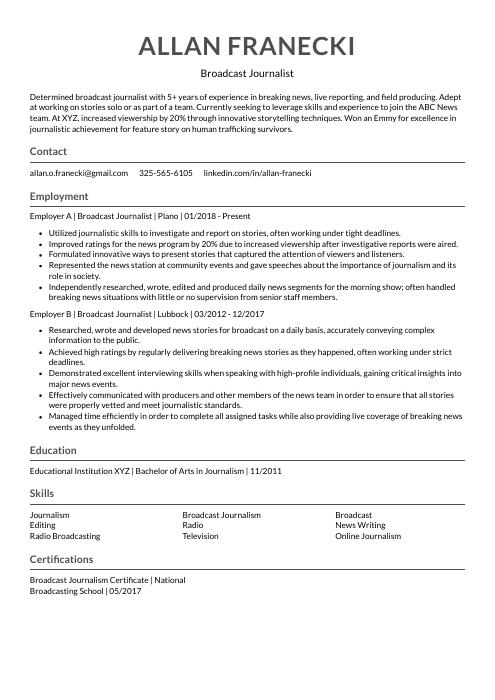 Indri
Indri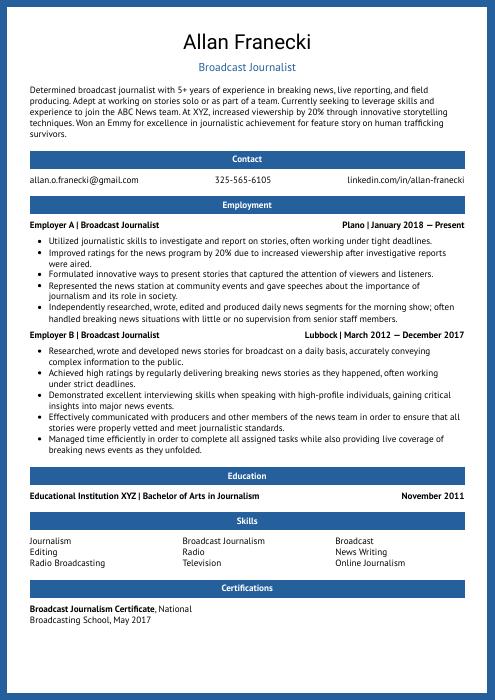 Ocelot
Ocelot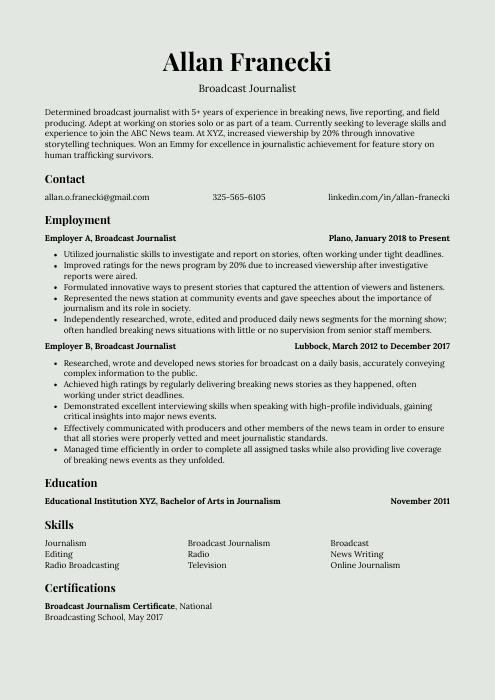 Saola
Saola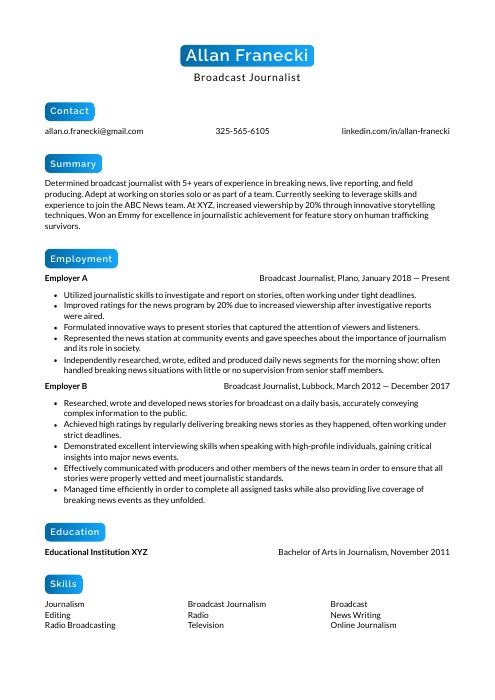 Kinkajou
Kinkajou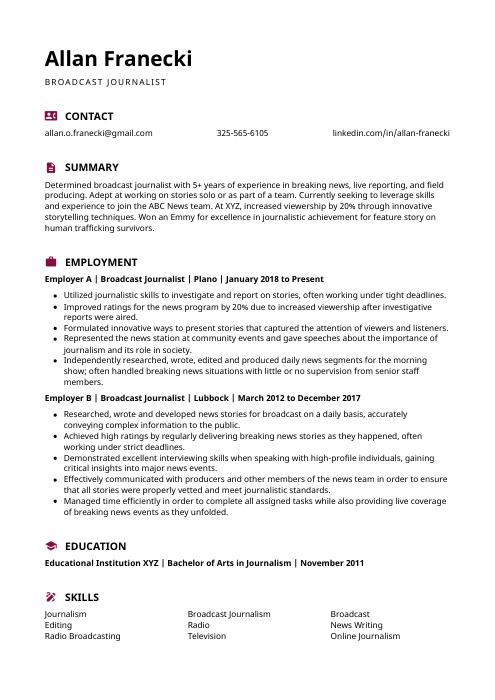 Hoopoe
Hoopoe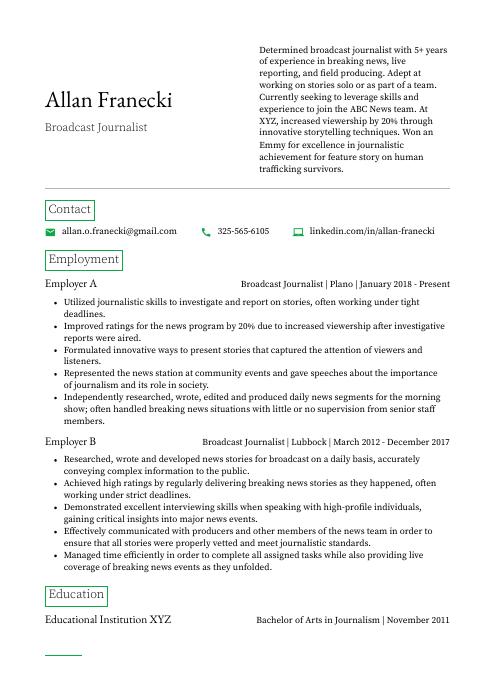 Quokka
Quokka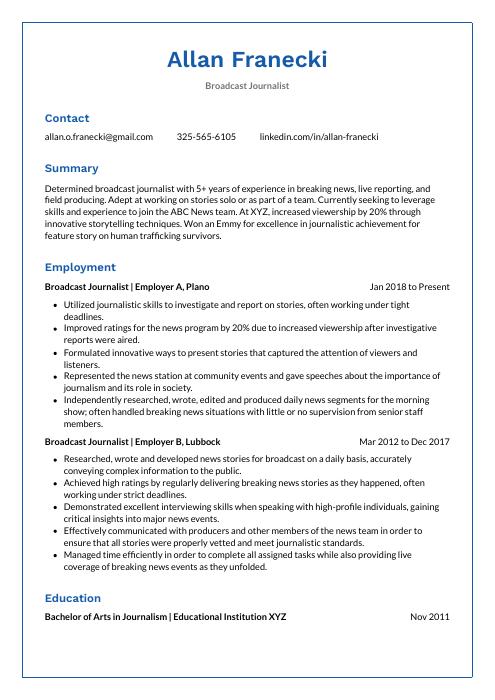 Markhor
Markhor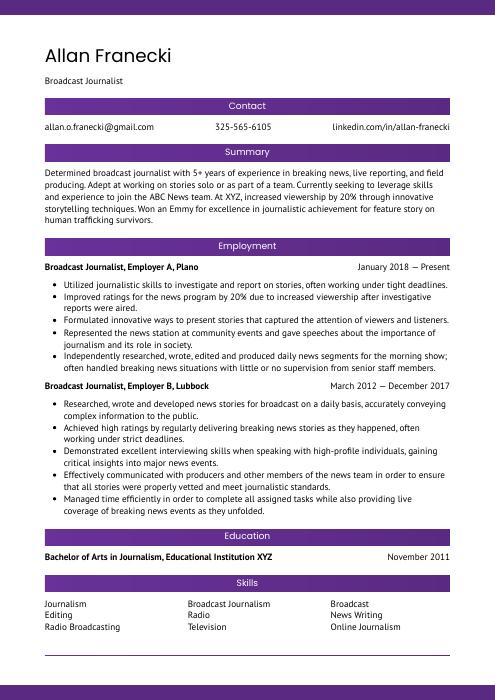 Jerboa
Jerboa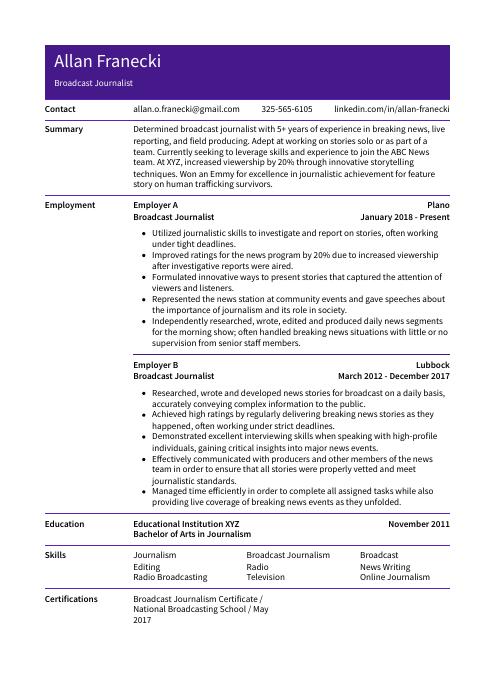 Pika
Pika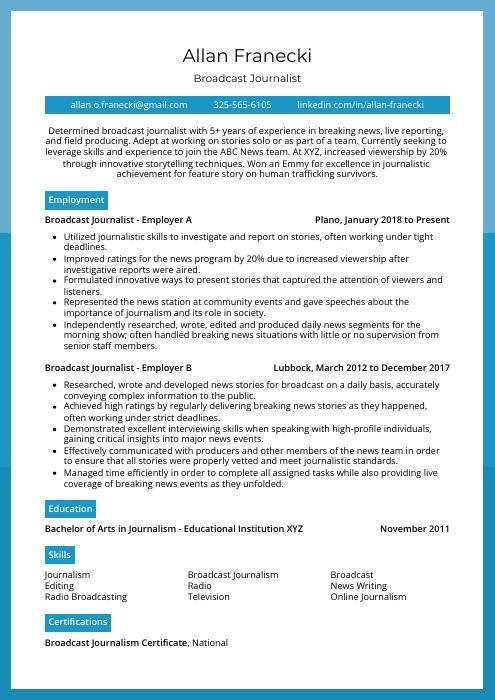 Rhea
Rhea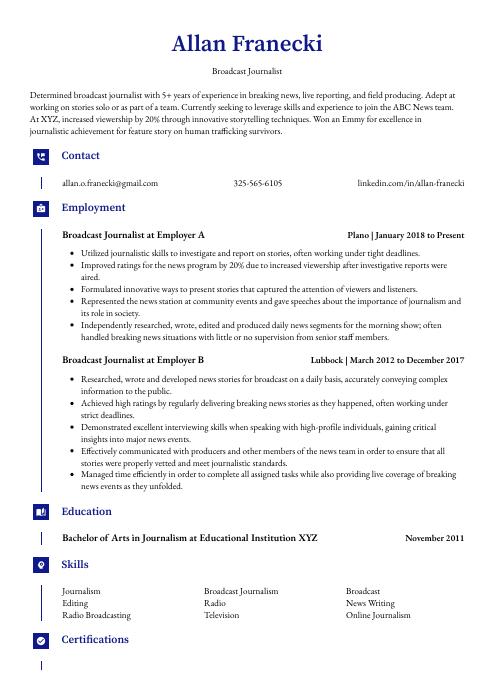 Gharial
Gharial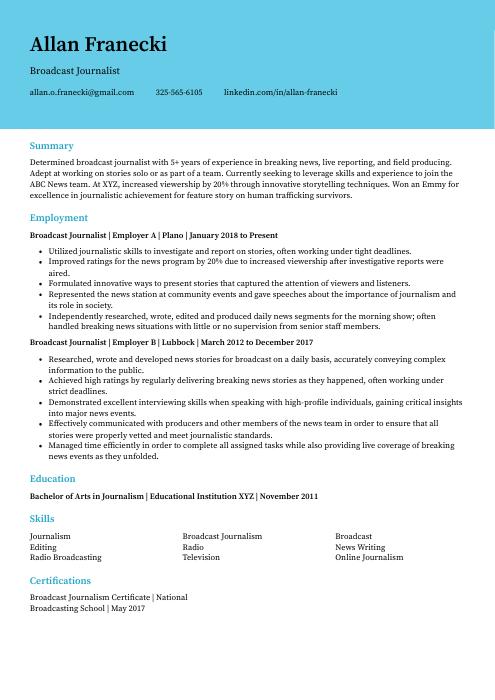 Dugong
Dugong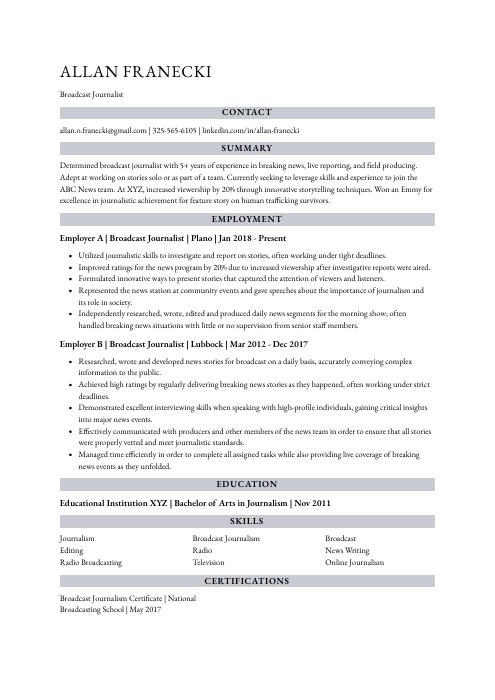 Numbat
Numbat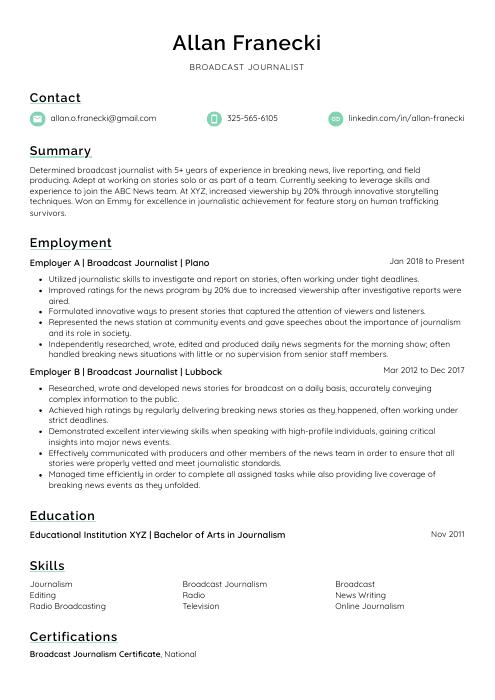 Lorikeet
Lorikeet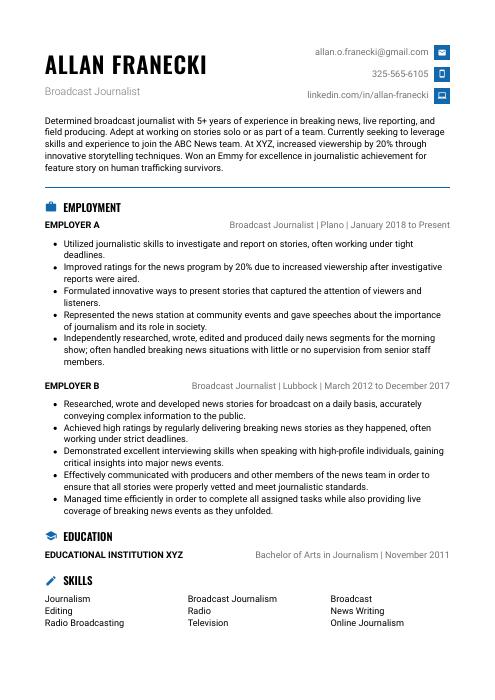 Echidna
Echidna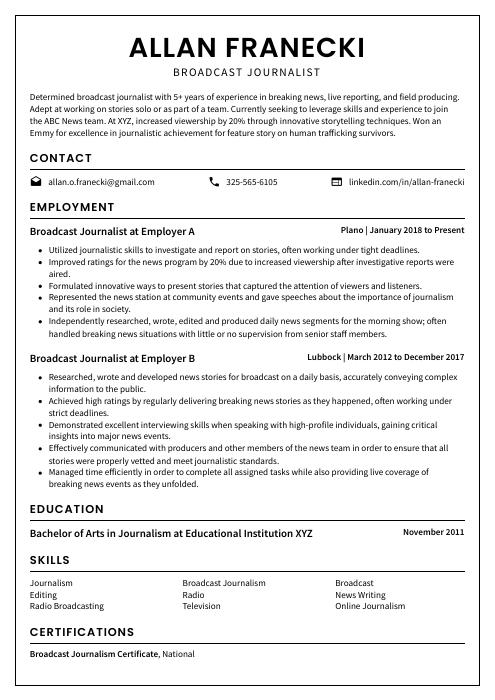 Cormorant
Cormorant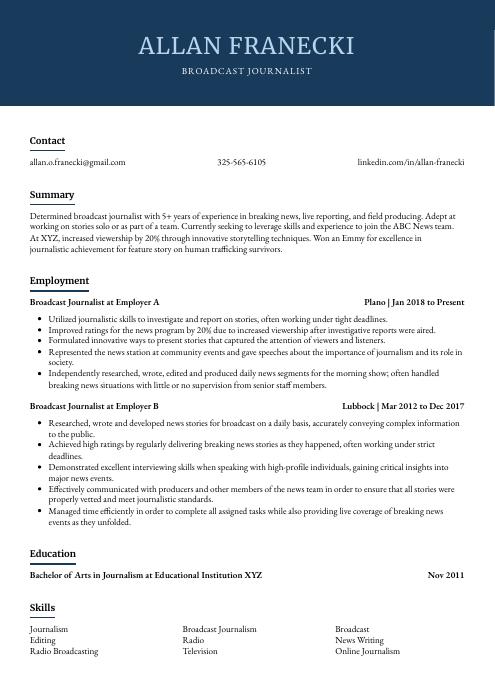 Bonobo
Bonobo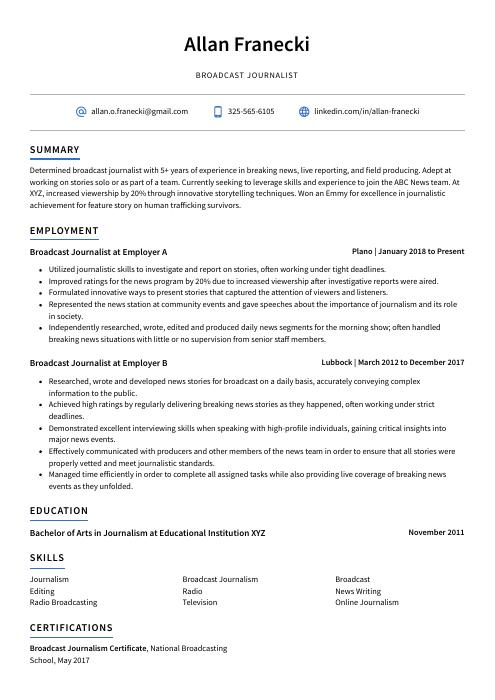 Axolotl
Axolotl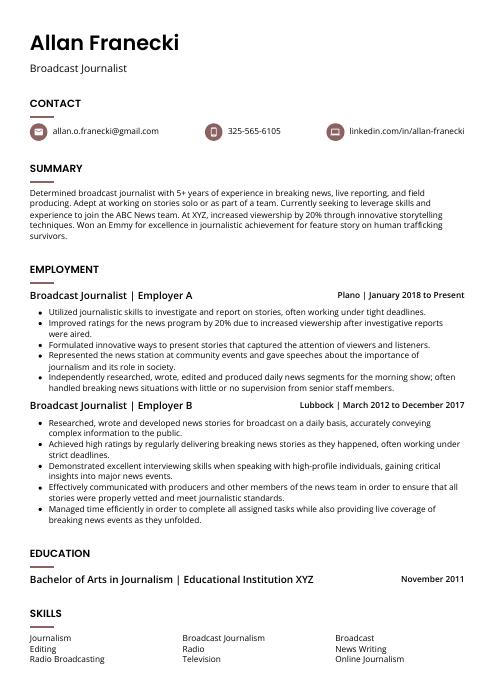 Fossa
Fossa Rezjumei
Rezjumei
